Best Waterproof Watches [Key Factors To Consider]
Note: This page contains affiliate links.
As an Amazon Associate, I earn from qualifying purchases when you click on the link, but you are not charged extra.
When it comes to selecting a reliable timepiece, the allure of waterproof watches cannot be overstated. Designed to withstand the rigors of daily life and various outdoor activities, these watches provide not only functionality but also peace of mind for the adventurous spirit. Whether you’re a casual swimmer, a dedicated diver, or simply someone who wants to ensure their watch can handle the occasional splash, understanding the different levels of water resistance and features is essential. This buyer’s guide aims to simplify the process of choosing the perfect waterproof watch by outlining key considerations and popular options available on the market today.
In this guide, we will delve into the various specifications that define waterproof watches, including water resistance ratings, materials used, and practical features to look for. Additionally, we’ll explore different styles and brands to help you make an informed decision tailored to your lifestyle and preferences. With a wealth of options at your fingertips, you can confidently select a waterproof watch that not only complements your aesthetic but also meets your functional needs for all your aquatic adventures.
Best Waterproof Watches: Quick Comparison Table
| Features | Pros | Cons | |
|---|---|---|---|
Men’s Assorted Luxury Quartz Wristwatches Set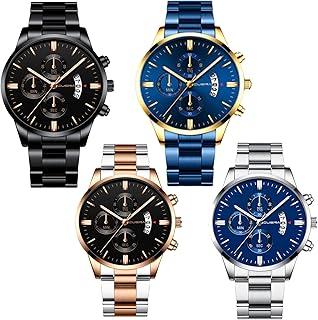 Check Price Check Price |
|
|
|
CakCity Men’s Digital Sports Military Watch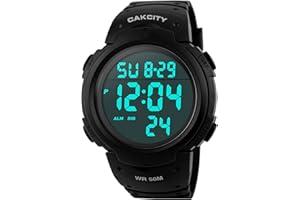 Check Price Check Price |
|
|
|
Men’s Casual Stainless Steel Big Face Analog Watch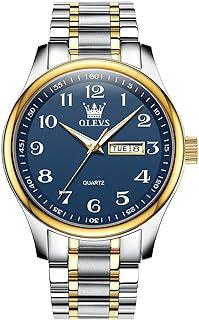 Check Price Check Price |
|
|
|
Men’s Tactical Digital-Analog Military Sport Watch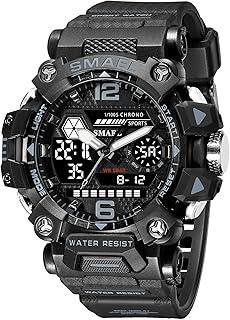 Check Price Check Price |
|
|
|
Men’s Luxury Analog Quartz Watch with Day-Date Feature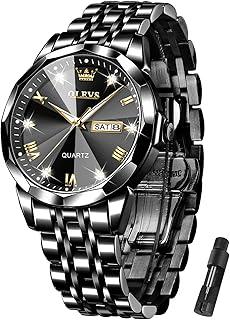 Check Price Check Price |
|
|
|
Unisex Luxury Diamond Analog Quartz Watch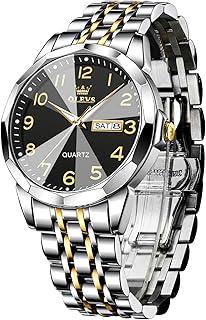 Check Price Check Price |
|
|
|
Men’s Classic Two-Tone Analog Wristwatch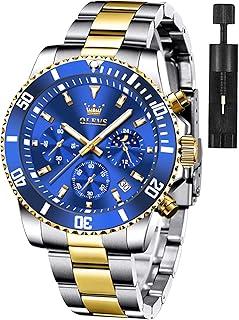 Check Price Check Price |
|
|
|
Ladies’ Gold and Silver Tone Analog Quartz Watch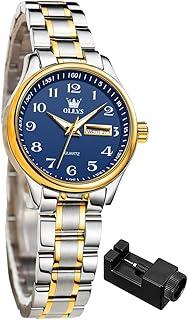 Check Price Check Price |
|
|
|
Luxury Tungsten Steel Analog Bracelet Watch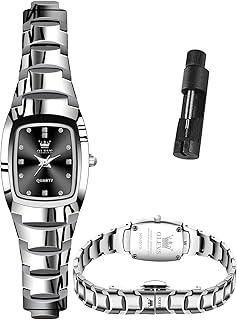 Check Price Check Price |
|
|
|
Women’s Luxury Diamond Dress Watch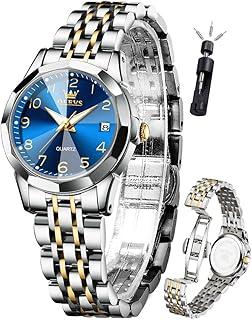 Check Price Check Price |
|
|
|
Recommendations For Best Waterproof Watches
Men’s Assorted Luxury Quartz Wristwatches Set
This set of four luxury quartz wristwatches offers a versatile addition to any man’s wardrobe. Each watch features a durable stainless steel band and a waterproof design, making them suitable for both casual and business settings. The variety of colors-Gold, Black, Blue, and Silver-ensures you have the perfect match for any outfit. Ideal for those seeking style and functionality at an affordable price.
Features:
- 4 assorted styles: Gold, Black, Blue, Silver
- Stainless steel band for durability
- Waterproof design for everyday wear
- Quartz movement for accurate timekeeping
- Luxury casual and business dress styles
Pros:
- Variety of styles to match different occasions
- Sturdy stainless steel construction
- Affordable wholesale set
- Waterproof feature enhances usability
Cons:
- Limited individual styling choices
- Quality may vary across styles
- Bulk purchase may not suit individual preferences
CakCity Men’s Digital Sports Military Watch
The CakCity Men’s Digital Sports Watch combines functionality with a rugged military design. Featuring a large LED display that is both waterproof and luminous, this watch is perfect for outdoor enthusiasts. With built-in stopwatch and alarm features, it caters to the needs of active individuals. Its robust construction ensures durability, while its stylish appearance makes it suitable for casual wear.
Features:
- LED screen with large face
- Waterproof design for outdoor activities
- Luminous display for low-light visibility
- Built-in stopwatch and alarm features
- Simple and rugged military style
Pros:
- Large, easy-to-read display
- Durable for extreme conditions
- Multiple functions for versatility
- Stylish military aesthetic
Cons:
- Bulky design may not suit all tastes
- Digital interface may not appeal to traditional watch lovers
- Limited battery life for LED functionality
Men’s Casual Stainless Steel Big Face Analog Watch
This Men’s Casual Stainless Steel Big Face Analog Watch features an elegant Roman numeral dial accented with diamonds. With a durable waterproof design and analog quartz movement, this watch combines style with functionality. The day and date function enhances practicality, making it suitable for both casual and formal occasions. Its large face ensures high readability, appealing to those who prefer bold timepieces.
Features:
- Large easy-to-read face
- Analog quartz movement
- Day and date function
- Waterproof design
- Stylish Roman numeral dial
Pros:
- Elegant design suitable for dressy occasions
- Versatile color options
- High readability with diamond accents
- Durable stainless steel construction
Cons:
- May be considered too large for smaller wrists
- Diamond accents may not appeal to everyone
- Analog movement requires regular winding
Men’s Tactical Digital-Analog Military Sport Watch
The Men’s Tactical Digital-Analog Military Sport Watch is engineered for the adventurous spirit. With its unique combination of digital and analog displays, this waterproof watch is perfect for outdoor activities. The large face and multiple color options enhance its appeal, while built-in features like an LED alarm, stopwatch, and calendar make it a highly functional accessory. This watch is designed for those who require durability without sacrificing style.
Features:
- Tactical design with both digital and analog displays
- Waterproof and suitable for outdoor use
- Large face for easy visibility
- LED alarm and stopwatch features
- Available in multiple colors
Pros:
- Versatile design for various activities
- Strong and durable construction
- Multiple functions enhance practicality
- Color options to suit personal style
Cons:
- Digital and analog combo may confuse some users
- Larger size may not fit all wrists comfortably
- Limited luxury appeal
Men’s Luxury Analog Quartz Watch with Day-Date Feature
This Men’s Luxury Analog Quartz Watch is a blend of style and practicality. Crafted with a stainless steel body, it features an eye-catching large face adorned with diamond accents. The watch includes a day and date display for added functionality and is designed to be waterproof, making it ideal for various occasions. Its elegant design makes it a perfect accessory for both casual outings and formal events.
Features:
- Stainless steel construction
- Analog quartz movement
- Day and date display
- Waterproof design
- Large face with diamond accents
Pros:
- High-end luxury feel
- Suitable for both casual and formal wear
- Durable and water-resistant
- Stylish diamond accents enhance elegance
Cons:
- Diamond accents may be overly flashy for some
- Size may not be suitable for all wrist sizes
- Analog watches require periodic maintenance
Unisex Luxury Diamond Analog Quartz Watch
The Unisex Luxury Diamond Analog Quartz Watch is designed for those who appreciate elegance and functionality. Featuring a large luminous face and diamond accents, this watch makes a statement while ensuring easy readability. The analog quartz movement provides accuracy, and its waterproof construction ensures durability. This versatile watch is suitable for both business and casual settings.
Features:
- Unisex design for versatility
- Large luminous face for easy reading
- Analog quartz movement
- Diamond accents for a luxurious look
- Waterproof construction
Pros:
- Stylish and elegant for both men and women
- Large face enhances readability
- Durable stainless steel design
- Luminous feature for low-light visibility
Cons:
- May be considered too flashy for everyday wear
- Unisex sizing may not fit all preferences
- Analog watches require more care
Men’s Classic Two-Tone Analog Wristwatch
This Men’s Classic Two-Tone Analog Wristwatch is an ideal accessory for those who appreciate elegance and functionality. With a big face that ensures visibility and a durable waterproof design, this watch is built for everyday wear. Featuring luminous hands for readability in low light and a practical date function, it seamlessly blends style with practicality. Suitable for both business and casual attire.
Features:
- Classic two-tone stainless steel design
- Big face for easy visibility
- Waterproof and durable
- Luminous hands for low-light readability
- Date function for practicality
Pros:
- Timeless design suitable for various occasions
- Durable stainless steel ensures longevity
- Luminous feature enhances visibility
- Versatile color options
Cons:
- Big face may not appeal to minimalists
- Color options may not suit everyone’s taste
- Analog movement needs regular maintenance
Ladies’ Gold and Silver Tone Analog Quartz Watch
This Ladies’ Gold and Silver Tone Analog Quartz Watch is tailored for women with smaller wrists. Featuring a sleek stainless steel band in gold and silver tones, this watch combines elegance with functionality. The analog quartz movement ensures accurate timekeeping, while the day and date display adds practicality. Its waterproof design makes it suitable for daily wear, perfect for business or formal occasions.
Features:
- Designed for small wrists
- Gold and silver tone stainless steel band
- Analog quartz movement
- Day and date display
- Waterproof design
Pros:
- Elegant design for business and formal wear
- Durable stainless steel construction
- Compact size for comfort
- Versatile color scheme
Cons:
- Limited to small wrist sizes
- Analog watches may need regular upkeep
- Day and date feature may be unnecessary for some
Luxury Tungsten Steel Analog Bracelet Watch
The Luxury Tungsten Steel Analog Bracelet Watch combines durability and elegance. With a stunning diamond dial and a unique square face, this watch is perfect for women who appreciate luxurious accessories. Crafted from tungsten steel, it is both stylish and durable. The waterproof design makes it suitable for various settings, whether at work or during casual outings. This watch exemplifies sophistication and functionality.
Features:
- Tungsten steel construction for durability
- Waterproof design for versatility
- Luxury analog quartz movement
- Diamond dial for a touch of elegance
- Square face for unique style
Pros:
- Stunning design with diamond accents
- Durable tungsten steel material
- Water-resistant for everyday use
- Unique square shape stands out
Cons:
- May not fit all wrist sizes comfortably
- Square face may not appeal to traditional tastes
- Analog watches require periodic maintenance
Women’s Luxury Diamond Dress Watch
The Women’s Luxury Diamond Dress Watch is an exquisite piece designed for the modern woman. Featuring a small face adorned with diamond accents, this watch offers both elegance and functionality. The two-tone gold and silver stainless steel band adds to its luxurious appeal, while the luminous hands ensure readability in various lighting conditions. With a date display and waterproof feature, this watch is perfect for any occasion, from formal events to everyday wear.
Features:
- Small face design for a delicate appearance
- Two-tone gold and silver stainless steel band
- Luminous hands for visibility
- Date display for practicality
- Waterproof feature for daily wear
Pros:
- Elegant and feminine design
- Durable and stylish two-tone finish
- Luminous feature enhances usability
- Perfect for both formal and casual settings
Cons:
- Small face may be difficult to read for some
- Diamond accents may not suit everyone’s taste
- Analog watches require regular maintenance
What To Consider When Choosing Waterproof Watches
Choosing a waterproof watch involves more than simply picking one that claims to be resistant to water. There are several crucial factors that can significantly impact your experience, usability, and satisfaction. Here are the key elements to consider:
1. Water Resistance Rating
The water resistance of a watch is usually indicated by a rating measured in meters (m) or atmospheres (ATM). Common ratings include:
- 30m (3 ATM): Suitable for splashes, rain, and hand washing, but not suitable for swimming or diving.
- 50m (5 ATM): Can handle swimming and shallow water activities, but not for diving.
- 100m (10 ATM): Suitable for recreational scuba diving and swimming.
- 200m (20 ATM) and above: Designed for professional diving, these watches can handle high-pressure underwater environments.
Understanding these ratings helps in selecting a watch that meets your specific needs. It’s vital to remember that the stated water resistance can diminish over time due to wear and tear or improper maintenance.
2. Construction Materials
The materials used in the watch can significantly affect its durability and water resistance. Here are some common materials to consider:
-
Case Material: Stainless steel, titanium, or plastic are common choices. Stainless steel offers strength and resistance to corrosion, while titanium is lighter and equally strong. Plastic can be more affordable but may not provide the same longevity or prestige.
-
Crystal: The glass covering the watch face is often made of sapphire, mineral, or acrylic. Sapphire crystal is highly scratch-resistant and ideal for durability, whereas mineral glass is less expensive and offers reasonable scratch resistance. Acrylic is lightweight and shatterproof but can scratch easily.
-
Gaskets and Seals: High-quality waterproof watches have rubber or silicone gaskets that create a seal between the case, crown, and back. Check that these components are designed to withstand pressure and prevent water ingress.
3. Watch Movement
The movement of the watch (automatic, quartz, or manual) can influence its water resistance. Quartz movements are often more resilient to water due to their simpler design, while automatic movements may have intricate components that could be compromised if not properly sealed. If you’re considering a watch for underwater use, ensure that the movement type has proven durability in aquatic environments.
4. Watch Design And Features
Consider the overall design of the watch. Some features to look for include:
-
Screw-down Crown: This feature helps to prevent water from entering the watch through the crown. It’s a vital aspect of design for watches rated for high water resistance.
-
Rotating Bezel: Especially important for divers, a rotating bezel helps track elapsed time underwater, adding a functional aspect to the watch.
-
Legibility: Clear dials and luminous hands or markers are essential for visibility in low-light or murky water conditions.
5. Intended Use
Identify the primary activities you plan to engage in while wearing the watch. Different activities require different levels of water resistance:
-
Casual Wear: If you need a watch for everyday use and occasional splashes, a watch with a rating of 30m to 50m will suffice.
-
Swimming and Snorkeling: For these activities, look for watches rated at least 100m.
-
Diving: Serious divers should opt for watches rated at 200m or more and check for additional features like a helium escape valve for saturation diving.
6. Brand Reputation And Warranty
Research the brand’s reputation for producing durable, high-quality waterproof watches. A reputable brand often indicates reliable performance and craftsmanship. Additionally, consider the warranty and after-sales support. A good warranty can provide peace of mind and assurance of the watch’s longevity.
Choosing a waterproof watch requires thoughtful consideration of various factors, including water resistance ratings, construction materials, movement type, and the watch’s intended use. By evaluating these aspects, you can find a timepiece that not only suits your lifestyle and aesthetic preferences but also withstands the rigors of aquatic activities. A well-chosen waterproof watch can become a trusted companion for your adventures, ensuring you keep track of time while embracing the elements. Whether you are diving into the depths of the ocean or simply enjoying a rainy day, a reliable waterproof watch can enhance your experience, merging functionality with style. Take the time to research and select wisely, ensuring that your choice is both practical and reflective of your personal style.
This comprehensive approach should provide a clear understanding of what to consider when choosing a waterproof watch and how to select one that aligns with your needs. If you have any specific aspects you’d like to delve deeper into or any questions, feel free to ask!
Benefits Of Owning Waterproof Watches
Waterproof watches have become increasingly popular in recent years, appealing to a diverse range of lifestyles and activities. While traditional timepieces have their own charm, waterproof models offer distinct advantages that enhance both practicality and longevity. Here are some of the key benefits of owning a waterproof watch:
1. Durability And Longevity
Waterproof watches are designed to withstand moisture, which significantly reduces the risk of damage from water exposure. This is particularly beneficial for individuals with active lifestyles or those who frequently engage in water-related activities, such as swimming, snorkeling, or sailing. Unlike standard watches that may succumb to water damage over time, waterproof models often feature durable materials, such as stainless steel, ceramic, or synthetic composites, which enhance their resistance to corrosion and wear. As a result, investing in a waterproof watch can lead to a longer lifespan, making it a wise financial decision.
2. Versatility
One of the most compelling reasons to own a waterproof watch is its versatility. These watches are not only suitable for casual wear but also seamlessly transition into formal settings. Whether you’re at the beach, in the gym, or attending a business meeting, a waterproof watch can complement various outfits and occasions. This adaptability means that you can enjoy a single timepiece for multiple scenarios without the need for constant changing, making it an excellent addition to any wardrobe.
3. Peace Of Mind
Owning a waterproof watch grants users peace of mind, knowing that their timepiece can withstand unexpected exposure to water. For many, this means being able to wear their watch while washing hands, swimming, or participating in other activities without constantly worrying about potential damage. This sense of security allows wearers to fully engage in their day-to-day lives and adventures, knowing that their watch is equipped to handle whatever comes its way.
4. Enhanced Functionality
Many waterproof watches come equipped with additional features designed for specific activities. For example, dive watches are built with rotating bezels that allow divers to track their time underwater, while sports watches might include timers, altimeters, or GPS functions. This added functionality makes waterproof watches not just a fashion statement, but also essential tools for enthusiasts of various hobbies and sports. Whether you’re a professional diver or a casual runner, a waterproof watch can enhance your experience and performance.
5. Stylish Design
Gone are the days when waterproof watches were bulky and unattractive. Today’s models are often sleek, stylish, and available in a variety of designs, catering to both aesthetic preferences and practical needs. High-end brands produce waterproof watches that rival traditional luxury watches in elegance and style, often incorporating precious metals and intricate detailing. This ensures that owners do not have to compromise on style for the sake of functionality.
6. Easier Maintenance
Water-resistant features often come with improved maintenance ease. Since these watches are designed to repel moisture, they are generally easier to clean and require less frequent servicing. Owners can simply rinse off their watch after exposure to saltwater or chlorinated pools to maintain its appearance, minimizing wear and tear over time. This ease of care can save time and money in the long run, making waterproof watches even more appealing.
7. Increased Value
Certain brands and models of waterproof watches, especially those with robust construction and high-performance features, tend to hold their value better than their non-waterproof counterparts. Collectors often seek out limited editions or vintage waterproof watches, increasing their market demand. For enthusiasts or those considering a future investment, owning a quality waterproof watch can be a savvy financial choice.
The benefits of owning a waterproof watch extend far beyond mere aesthetics. From their remarkable durability and versatility to the peace of mind they provide, these timepieces cater to a variety of lifestyles and activities. The stylish designs available today mean that wearers no longer need to choose between function and fashion, while enhanced features can significantly improve one’s experience in sports and leisure.
Whether you are an adventure seeker, a professional, or someone who simply appreciates the reliability of a well-crafted watch, investing in a waterproof model is a choice that offers both practicality and elegance. The long-lasting nature of these watches, combined with their increased market value, solidifies their place as a smart addition to anyone’s collection. As we navigate an increasingly fast-paced world filled with unpredictable environments, the waterproof watch stands out as a beacon of resilience and reliability, perfectly embodying the balance of style and function.
Features To Look For In The Best Waterproof Watches
When seeking the ideal waterproof watch, enthusiasts and casual wearers alike should consider a variety of features that ensure both functionality and durability. Waterproof watches are designed to withstand the elements, making them indispensable for anyone who enjoys outdoor activities, swimming, or simply wants the peace of mind that comes from knowing their watch can handle the unexpected. Here are the key features to look for when selecting the best waterproof watch:
1. Water Resistance Rating
The most crucial feature of any waterproof watch is its water resistance rating, typically measured in meters (m) or atmospheres (ATM). Understanding these ratings is essential:
-
30m (3 ATM): Suitable for everyday use, such as splashes of water or brief immersion, like washing hands. However, it’s not suitable for swimming or showering.
-
50m (5 ATM): Can withstand light swimming and showering but not suitable for diving.
-
100m (10 ATM): Ideal for recreational swimming and snorkeling. This rating often indicates the watch can endure greater pressure.
-
200m (20 ATM) or more: Designed for professional diving and water sports. Watches with this rating can handle significant water pressure and are built to perform under extreme conditions.
These ratings are often certified by organizations such as ISO (International Organization for Standardization), ensuring a standard of reliability and performance.
2. Case Material
The case material of a watch significantly influences its durability and resistance to water. The most common materials include:
-
Stainless Steel: Known for its strength and resistance to corrosion, stainless steel is a popular choice. It’s both stylish and functional, making it suitable for both casual and formal wear.
-
Titanium: Lighter than stainless steel, titanium offers exceptional strength and is highly resistant to corrosion. It’s an excellent choice for those who prioritize comfort without compromising durability.
-
Plastic or Resin: Often found in more affordable options, plastic or resin cases are lightweight and can be designed to be shock-resistant. They are perfect for sports watches and casual styles but may lack the longevity of metal options.
3. Screw-Down Crown And Case Back
The crown (the knob used to set the time) and the case back are critical points of vulnerability in any watch. A screw-down crown creates a watertight seal when the crown is pushed in, effectively blocking water from entering the case. Similarly, a screw-down case back provides an added layer of security against water intrusion, making it essential for high-quality waterproof watches.
4. Crystal Type
The watch crystal protects the face of the watch from scratches and damage while also affecting water resistance. The most common types include:
-
Sapphire Crystal: Known for its exceptional scratch resistance and clarity, sapphire crystal is highly preferred in luxury and professional-grade watches. Its hardness ensures it remains clear and undamaged, even in the harshest environments.
-
Mineral Glass: More affordable and less scratch-resistant than sapphire, mineral glass can still offer decent protection. However, it may not withstand heavy impacts or scratches as well.
-
Acrylic: This plastic material is lightweight and shatterproof but scratches easily, making it less suitable for rugged use.
5. Gaskets And Seals
Waterproof watches utilize gaskets and seals made from materials such as rubber or silicone to create watertight barriers between different components. High-quality gaskets should be flexible and durable to maintain their integrity over time, particularly in extreme conditions. Look for watches with multiple gaskets to enhance water resistance.
6. Diving Features
For those interested in diving, additional features such as a unidirectional rotating bezel, depth gauge, and luminous markers are essential. The unidirectional bezel allows divers to track their time underwater, while a depth gauge helps monitor how deep they are. Luminous markers ensure visibility in low-light conditions, which is crucial when submerged.
7. Durability And Shock Resistance
While water resistance is critical, durability against shocks and impacts is equally important. Many waterproof watches are constructed to meet military or industry standards for shock resistance. Look for certifications such as ISO 6425, which indicates that the watch has been tested under extreme conditions, ensuring it can withstand both water pressure and physical shocks.
8. Comfort And Wearability
Finally, comfort should never be overlooked. The watch band material—whether it be rubber, silicone, stainless steel, or leather—plays a significant role in wearability. Adjustable and breathable straps can enhance comfort, especially during prolonged wear or when engaging in physical activities. Additionally, the weight and design should be balanced, ensuring the watch does not feel cumbersome on the wrist.
Choosing the right waterproof watch involves careful consideration of various features that align with your lifestyle and activities. A watch’s water resistance rating, case material, and protective features such as gaskets and seals are paramount in ensuring it can withstand the rigors of aquatic environments. Furthermore, the inclusion of practical features for diving, such as a rotating bezel and shock resistance, will significantly enhance its utility.
Ultimately, the best waterproof watches seamlessly blend functionality, durability, and style. Whether you are an avid diver, a casual swimmer, or someone who simply wants a reliable timepiece for everyday wear, understanding these essential features will guide you toward a choice that not only meets your needs but also provides peace of mind in any environment. As you embark on your quest for the perfect waterproof watch, remember that a well-informed decision will not only enhance your wristwear collection but also enrich your adventures, allowing you to explore the depths of both land and sea without hesitation.
How To Choose The Right Size
Choosing the right size for a waterproof watch involves more than simply picking a style that looks appealing; it requires a careful consideration of various factors, including the watch’s functionality, your wrist size, and the intended use of the watch. With the increasing popularity of waterproof watches for both casual and professional purposes—such as diving, swimming, and everyday wear—it’s essential to ensure that the watch you select not only meets your aesthetic preferences but also fits comfortably and securely on your wrist.
Understanding Watch Sizes
Watch sizes can typically be categorized based on case diameter and thickness. The case diameter, measured in millimeters (mm), is the most commonly referenced size. A larger case may appear bold and stylish, while a smaller one can offer a more subtle and sophisticated look. The case thickness is another crucial aspect, particularly for waterproof watches, as thicker cases often imply more robust construction and better water resistance. However, a very thick watch may feel cumbersome on the wrist, particularly for everyday wear.
The lug width, which is the distance between the lugs (the parts of the watch case where the strap attaches), can also affect how a watch looks and feels. Wider lug widths generally accommodate larger straps and can enhance the watch’s overall presence on the wrist. However, the lug width should harmonize with the case diameter for a balanced appearance.
Finding The Right Fit
One of the most important considerations when selecting a waterproof watch is your wrist size. To find the right fit, measure your wrist circumference using a soft measuring tape. For those without a measuring tape, a piece of string can serve as an effective alternative. Wrap the string around your wrist, mark where it overlaps, and then measure the length with a ruler.
For smaller wrists (typically under 7 inches), watches with a case diameter between 34mm and 40mm tend to provide a proportionate look without overwhelming the wrist. Conversely, those with medium wrists (7-8 inches) can comfortably wear watches ranging from 38mm to 44mm, while individuals with larger wrists (over 8 inches) might consider watches with a case diameter exceeding 44mm.
Consider The Purpose
The intended purpose of the waterproof watch also plays a significant role in determining the appropriate size. If you plan on using the watch for diving or other water-related activities, a larger, more robust watch with a substantial case and thick strap may be beneficial for readability and ease of use. Many dive watches also come equipped with features such as rotating bezels and luminescent markers, which can enhance usability in underwater environments.
On the other hand, if you’re selecting a waterproof watch for daily wear or casual outings, you may prefer a more understated size that can transition seamlessly from sporty to formal occasions. A medium-sized watch with a simple design may be a versatile addition to your wardrobe, complementing both casual and professional attire.
Comfort And Style
Comfort is paramount when selecting the right watch size. A watch should fit snugly on the wrist without pinching or sliding too loosely. Many brands offer adjustable straps or interchangeable bands, allowing you to tailor the fit to your preference. When trying on a waterproof watch, make sure to assess how it feels during movement. The watch should not dig into your wrist or cause irritation.
The style of the watch also plays a significant role in size selection. For instance, a rugged, sporty watch may look best with a larger case and wider strap, while a dressier watch may have a more slender profile. Be mindful of how the watch’s design interacts with its size. A watch with a lot of visual weight can appear larger than its actual dimensions due to design elements like color, texture, and detailing.
In the world of waterproof watches, size matters significantly—not just for aesthetic appeal, but for comfort, functionality, and performance. By understanding how to gauge your wrist size, considering the purpose of the watch, and prioritizing comfort alongside style, you can make an informed decision that meets your needs and preferences. Whether you seek a durable diving watch or a versatile piece for everyday wear, the right size will ensure that your waterproof watch not only looks great but performs beautifully in any environment. Remember, a well-chosen watch can enhance not just your appearance but also your confidence and experience in various activities, whether above water or below.
Durability And Performance
Waterproof watches have captivated enthusiasts and casual wearers alike, offering both functionality and style in a single package. Designed to withstand exposure to water, these timepieces not only serve as reliable accessories but also embody a range of technologies and materials that enhance their durability and performance.
The Importance Of Water Resistance Ratings
The effectiveness of waterproof watches is often defined by their water resistance ratings, which are expressed in meters (m) or atmospheres (ATM). These ratings provide insights into how deep a watch can be submerged and for how long without compromising its integrity. For instance, a watch rated for 30 meters (3 ATM) is suitable for everyday wear, including splashes and rain, but is not intended for swimming. Conversely, a watch rated at 200 meters (20 ATM) can handle diving activities and prolonged exposure to water, making it ideal for professional divers and water sports enthusiasts.
To gauge the true capabilities of a watch, it’s essential to understand the implications of these ratings. Manufacturers typically subject their watches to rigorous testing, simulating underwater conditions to ensure they meet or exceed specified standards. It is worth noting that these ratings apply to static conditions. Dynamic movements, like those experienced during vigorous activities, can increase the pressure exerted on the watch, necessitating a cautious approach even with highly rated models.
Construction Materials And Technologies
The construction of waterproof watches involves advanced materials and technologies designed to enhance performance and durability. High-grade stainless steel is commonly used for the case and bracelet, providing both corrosion resistance and structural integrity. Some manufacturers even opt for titanium or ceramic cases, which are lighter and offer superior scratch resistance, further enhancing the watch’s longevity.
Another critical component is the gasket system, which seals the case and prevents water intrusion. O-rings, made from durable rubber or silicone, are strategically placed around the crown, case back, and crystal to create a watertight seal. The effectiveness of these gaskets can diminish over time due to wear and tear, so regular maintenance is essential to ensure ongoing water resistance.
The crystal is equally important in determining a watch’s performance in water. Sapphire crystal is the preferred choice among many luxury brands due to its hardness and scratch resistance. However, even mineral glass can be engineered to withstand pressure, provided it is adequately treated during manufacturing.
Movement And Functionality
The heart of any watch is its movement, and waterproof watches often utilize mechanical or quartz movements designed specifically for aquatic environments. Mechanical movements are revered for their craftsmanship and precision, but they may require more care to ensure their longevity under water. On the other hand, quartz movements, particularly those with battery-saving features, can be incredibly reliable in varying conditions, making them suitable for everyday wear.
Many waterproof watches also come equipped with additional functionalities tailored for aquatic activities. Dive watches, for example, may feature rotating bezels that allow divers to track elapsed time underwater. Some models include depth gauges, luminescent markers for visibility in low-light conditions, and helium escape valves that accommodate saturation diving. These features enhance both the usability and performance of the watch, making them indispensable tools for professionals and enthusiasts alike.
Style Meets Function
While durability and performance are crucial, waterproof watches do not compromise on style. They come in a variety of designs, from rugged, utilitarian models suited for adventure to elegant, refined pieces ideal for formal occasions. Brands often collaborate with renowned designers to create timepieces that blend function and fashion, ensuring that wearers do not have to sacrifice aesthetics for practicality. This versatility has contributed to the widespread appeal of waterproof watches, allowing them to seamlessly transition from the beach to the boardroom.
Maintenance And Care
To maintain the performance and longevity of waterproof watches, proper care is essential. Regular cleaning, particularly after exposure to saltwater or chlorine, can help preserve the integrity of the materials and gaskets. Routine checks by a professional watchmaker can ensure that seals are intact, preventing potential leaks. Additionally, avoiding extreme temperature changes and impacts can help extend the lifespan of both the watch and its components.
Waterproof watches embody a harmonious blend of durability, performance, and style, making them indispensable tools for those who lead active lifestyles. Their carefully engineered water resistance ratings, advanced materials, and thoughtful design features equip them to withstand a range of environments, from deep-sea explorations to everyday splashes. As technology continues to evolve, the future of waterproof watches promises even greater innovations, allowing wearers to embrace their adventurous spirits without compromising on reliability or elegance. Whether for professional diving, casual wear, or outdoor adventures, a quality waterproof watch serves not just as a timekeeping device but as a trusted companion, reflecting the seamless intersection of function and fashion in the modern world.
How To Care For Your Waterproof Watches
Waterproof watches are designed to withstand the elements, making them a popular choice for divers, outdoor enthusiasts, and anyone who enjoys an active lifestyle. However, even these robust timepieces require proper care and maintenance to ensure they function optimally and retain their aesthetic appeal over the years. Understanding how to care for your waterproof watch can enhance its longevity and performance. Here’s a detailed guide on the essential steps to keep your watch in top condition.
1. Understand Your Watch’s Water Resistance Rating
Before diving into care tips, it’s crucial to know your watch’s water resistance rating. This rating is usually marked on the watch face or back and is measured in meters (e.g., 30m, 50m, 100m, or 200m). Here’s a quick overview:
- 30m/3 ATM: Suitable for splashes of water, such as rain or washing hands, but not for swimming or showering.
- 50m/5 ATM: Can withstand light swimming but not snorkeling or diving.
- 100m/10 ATM: Suitable for swimming and snorkeling but not for deep diving.
- 200m/20 ATM: Designed for recreational scuba diving.
- 300m/30 ATM and above: Suitable for professional diving.
Understanding these ratings helps you know your watch’s limitations, guiding how and when to wear it. Always avoid exposing it to conditions beyond its rating to prevent water damage.
2. Regularly Inspect Gaskets And Seals
The gaskets and seals of your waterproof watch play a vital role in maintaining its water resistance. These rubber or silicone components prevent water from entering the watch casing. Over time, they can wear out, especially with exposure to moisture, heat, and pressure. Regular inspection is crucial, especially if you frequently wear your watch in water.
- Visual Checks: Every few months, examine the case and the area around the crown (the knob used for setting the time) for signs of wear or damage. If you notice any cracks or fraying, it’s time to replace the gaskets.
- Professional Servicing: Consider taking your watch to a professional for a comprehensive check every few years. They can replace worn gaskets and perform a water resistance test to ensure everything is functioning properly.
3. Clean Your Watch Regularly
Even waterproof watches can accumulate dirt, sweat, and salt residue, especially if worn during physical activities or in harsh environments. Regular cleaning helps maintain both the aesthetic and functional quality of your watch.
- Materials Matter: Depending on your watch’s materials (stainless steel, rubber, leather, or others), the cleaning method may vary. For stainless steel or rubber straps, use a soft cloth or a toothbrush with mild soap and water. For leather, opt for a specialized leather cleaner to avoid damaging the material.
- Avoid Harsh Chemicals: Steer clear of harsh chemicals or solvents that can damage the watch’s finish or components.
4. Avoid Extreme Temperatures And Sudden Temperature Changes
While waterproof watches are designed to handle water, they are not always built to withstand extreme temperature fluctuations. Rapid changes in temperature can lead to condensation forming inside the watch, potentially damaging the movement.
- Hot Water Caution: Avoid exposing your watch to hot water, such as during showers or hot tubs. High temperatures can cause the seals to expand and lose their effectiveness, increasing the risk of water entering the watch.
- Cold Conditions: Similarly, in cold temperatures, the lubricants within the watch movement can thicken, affecting its accuracy.
5. Wind Your Automatic Watches Regularly
If you own an automatic waterproof watch, ensure you wind it regularly. Automatic watches rely on the movement of your wrist to keep running, but if not worn for an extended period, they may stop. Manual winding helps keep the internal mechanisms lubricated and functioning smoothly.
- Winding Procedure: To manually wind, gently turn the crown clockwise for about 20-30 turns. This process ensures that the mainspring is adequately wound, maintaining the watch’s accuracy.
6. Be Cautious With The Crown And Pushers
The crown and pushers (buttons on the watch) are critical points where water can enter. When using these functions, ensure that the crown is fully pushed in or screwed down, as appropriate.
- Post-Usage Checks: After adjusting the time or using any functions, double-check that everything is secure before exposing the watch to water.
- Avoid Water While Using Functions: Avoid operating the crown or pushers when the watch is submerged, as this can compromise the seals.
7. Store Your Watch Properly
Proper storage of your waterproof watch is essential for its longevity, particularly when it’s not being worn. Store your watch in a cool, dry place away from direct sunlight and extreme temperature variations.
- Watch Boxes: Use a dedicated watch box or a soft pouch to prevent scratches and other damage when storing multiple timepieces.
- Avoid Humidity: If you live in a humid climate, consider using silica gel packets or a dehumidifier to help absorb excess moisture in the storage area.
Caring for your waterproof watch is not just about maintaining its appearance; it’s about preserving its functionality and ensuring it can withstand the test of time and the elements. By understanding your watch’s water resistance rating, regularly inspecting gaskets and seals, cleaning it properly, and taking care during temperature changes, you can significantly enhance its lifespan.
Additionally, by treating your watch with respect—winding it properly, using the crown and pushers cautiously, and storing it correctly—you will ensure it remains a reliable companion on all your adventures. With these maintenance practices, your waterproof watch can continue to be a symbol of both style and durability, ready for any situation life throws your way. Whether you’re scaling mountains or diving deep beneath the waves, a well-cared-for waterproof watch will always be your trusted ally.
Comparing Waterproof Watches With Alternatives
In today’s fast-paced world, the significance of a reliable timepiece cannot be overstated. Watches are not merely instruments for keeping time; they are an extension of our personality and style. With the advent of technology, the market has seen a surge in various types of watches, including waterproof models, which stand out for their unique capabilities. However, as with any product, it’s essential to evaluate the strengths and weaknesses of waterproof watches against their alternatives, such as water-resistant watches, smartwatch options, and traditional non-waterproof timepieces.
Understanding Waterproof Watches
Waterproof watches are engineered to withstand exposure to water, making them suitable for various activities, from swimming to deep-sea diving. Unlike their water-resistant counterparts, which can only endure limited exposure, waterproof watches are often classified into specific pressure ratings, typically measured in meters or atmospheres (ATM). For instance, a watch rated for 100 meters is suitable for swimming but not necessarily for diving.
One of the key advantages of waterproof watches is their durability. They are constructed with robust materials, such as stainless steel or titanium, and feature seals that prevent water ingress. Additionally, many waterproof watches are equipped with unidirectional rotating bezels, allowing divers to track elapsed time underwater easily. Moreover, the aesthetic appeal of waterproof watches cannot be overlooked. They often come in sporty designs that cater to adventure enthusiasts, making them not only functional but also fashionable.
Water-Resistant Watches
In contrast, water-resistant watches offer limited protection against moisture. These watches are typically rated for everyday activities, such as splashes from washing hands or light rain, but are not suitable for swimming or diving. The primary benefit of water-resistant watches lies in their versatility and lower price point, making them accessible for a broader audience. However, they do require more caution from the wearer, as exposure to water can compromise their functionality.
For individuals who lead a more active lifestyle or engage in water sports, a waterproof watch would be a more prudent investment. However, those who are less likely to encounter water hazards may find water-resistant options to be perfectly adequate.
Smartwatches
Another compelling alternative to traditional waterproof watches is the smartwatch. These devices have revolutionized the way we interact with technology, combining timekeeping with a multitude of features such as fitness tracking, notifications, and even GPS capabilities. Many smartwatches now come with water resistance ratings suitable for swimming, making them a viable alternative to waterproof watches.
The appeal of smartwatches lies in their multifunctionality. Users can monitor their heart rate, track workouts, receive messages, and access a plethora of apps, all from their wrist. However, while smartwatches can be water-resistant, they often lack the rugged durability and aesthetic charm of traditional waterproof watches. Moreover, battery life can be a concern; many smartwatches require regular charging, which may be inconvenient for users who prefer a set-it-and-forget-it approach to timekeeping.
Traditional Non-Waterproof Watches
Finally, traditional non-waterproof watches represent yet another alternative. These timepieces, often crafted with exquisite materials and intricate designs, are ideal for formal occasions or everyday wear in dry environments. While they may lack the resilience of waterproof or water-resistant models, they can offer a level of craftsmanship and elegance that appeals to those who prioritize aesthetics over functionality.
However, it’s crucial to consider the potential drawbacks of non-waterproof watches. Exposure to moisture can lead to damage, rendering the timepiece inoperable and potentially diminishing its value. For wearers who frequently find themselves in environments where water exposure is a risk, a non-waterproof watch might become a liability.
In the realm of timepieces, the choice between waterproof watches and their alternatives ultimately boils down to lifestyle, preferences, and intended use. Waterproof watches stand out for their durability, rugged design, and suitability for water-related activities, making them an ideal choice for adventurers and outdoor enthusiasts. In contrast, water-resistant watches and traditional non-waterproof options offer versatility and elegance, catering to those who may not require extensive water protection. Smartwatches present a modern alternative, merging technology with traditional timekeeping. They offer a broad range of features but may lack the timeless appeal and craftsmanship found in mechanical or analog watches. As the market continues to evolve, consumers are faced with an array of options that cater to various needs and preferences. Ultimately, the best watch for you is one that aligns with your lifestyle, activities, and personal taste. Whether you choose the rugged reliability of a waterproof watch or the stylish elegance of a traditional timepiece, your choice will undoubtedly reflect your unique personality and values.
Style And Design Trends For Waterproof Watches
In recent years, the realm of waterproof watches has evolved from purely functional timepieces into coveted fashion accessories. This transformation is a testament to the ingenuity of watchmakers who have successfully blended durability with aesthetics, catering to a diverse audience that values both performance and style. Here are some of the key style and design trends shaping the future of waterproof watches:
1. Material Innovations
The materials used in waterproof watches have significantly expanded, offering both enhanced functionality and refined aesthetics. Traditionally, stainless steel was the go-to choice, known for its robustness and resistance to corrosion. However, brands are now embracing a range of materials:
-
Titanium: Lighter than steel and equally durable, titanium is becoming increasingly popular for its hypoallergenic properties and sleek appearance. Its matte finish offers a modern look that appeals to both adventurers and urban dwellers.
-
Ceramic: Known for its scratch resistance and lightweight nature, ceramic has made a splash in luxury waterproof watches. Its ability to maintain a polished look over time makes it a favorite among high-end brands, providing a glossy finish that stands out.
-
Carbon Fiber: Utilized in high-performance sports watches, carbon fiber provides strength without added weight. Its unique texture and patterns offer a rugged appeal that attracts outdoor enthusiasts.
2. Color Palettes And Finishes
Gone are the days when waterproof watches were limited to monochromatic hues. Current trends showcase a vibrant array of colors and finishes:
-
Bold Colors: Bright blues, vivid greens, and striking reds are trending, making waterproof watches not just functional tools but also statement pieces. Brands are also experimenting with two-tone combinations, where a contrasting bezel can add visual interest.
-
Matte Finishes: The matte finish trend has surged, lending a contemporary feel to traditional designs. This style provides a softer look, appealing to those seeking a less flashy alternative while still maintaining sophistication.
-
Gradient Dials: A growing trend involves gradient dials that transition between shades, adding depth and dynamism to the watch face. These dials enhance visibility while providing a unique flair, especially when paired with luminous hands.
3. Functionality Meets Aesthetics
Waterproof watches are not just about keeping water at bay; they are increasingly designed to offer multifunctional capabilities that cater to the active lifestyle:
-
Smart Features: The integration of smart technology is revolutionizing waterproof watches. From fitness tracking to GPS navigation, modern designs incorporate advanced functionalities without compromising style. Brands are developing sleek, smart designs that blend seamlessly with traditional aesthetics.
-
Diverse Complications: Beyond timekeeping, watchmakers are incorporating various complications such as chronographs, altimeters, and tide graphs, appealing to outdoor enthusiasts and sports aficionados. These added features are often designed to be visually striking, integrating seamlessly into the overall watch design.
4. Sustainable Practices
With growing awareness around environmental concerns, many brands are now focusing on sustainability in their manufacturing processes. The use of recycled materials, eco-friendly packaging, and ethical sourcing is becoming standard practice:
-
Recycled Materials: Some brands have started using recycled plastics and metals, contributing to the fight against pollution while still delivering high-quality products. This approach not only helps reduce waste but also attracts eco-conscious consumers.
-
Solar Technology: Solar-powered watches are gaining popularity due to their energy efficiency and reduced need for battery replacements. This technology offers long-lasting performance while minimizing environmental impact, aligning with a more sustainable lifestyle.
5. Timeless Designs With A Modern Twist
While trends come and go, the classic designs remain steadfast, often receiving a contemporary refresh.
-
Vintage-Inspired Designs: Nostalgia is a powerful force in fashion, and many brands are reviving classic styles from the past. Vintage-inspired designs, often featuring bold markers and distinctive cases, resonate with collectors and enthusiasts alike.
-
Streamlined Profiles: The trend towards minimalism continues to dominate, with sleek, streamlined profiles that emphasize elegance and functionality. These designs often feature clean lines, simplifying the aesthetic while maintaining versatility for both casual and formal occasions.
Conclusion
The evolution of waterproof watches is a fascinating intersection of style, innovation, and functionality. As consumer preferences shift towards unique designs that reflect personal style while meeting the demands of an active lifestyle, watchmakers are rising to the occasion, crafting timepieces that are as much about fashion as they are about function.
From the integration of advanced materials to sustainable practices, the trends shaping this industry highlight a commitment to not only meeting the practical needs of users but also appealing to their desire for aesthetic excellence. As waterproof watches continue to merge cutting-edge technology with timeless design, they will undoubtedly maintain their status as indispensable accessories for both adventurers and everyday wearers alike.
Ultimately, the future of waterproof watches looks bright, promising exciting innovations and captivating designs that will continue to inspire watch enthusiasts around the globe. Whether for diving into the depths of the ocean or making a fashion statement on the streets, these timepieces have solidified their place in the world of horology, celebrating the harmony between utility and elegance.
FAQs
What Does It Mean For A Watch To Be Waterproof?
A waterproof watch is designed to resist the penetration of water to varying degrees, typically indicated by a water resistance rating measured in meters or atmospheres (ATM). This rating informs users how deep they can submerge the watch without risking water damage.
How Is The Water Resistance Of A Watch Tested?
Water resistance is usually tested using specialized equipment that subjects the watch to high pressure in a controlled environment. This testing simulates various depths and conditions to ensure the watch can withstand specified water exposure without leaking.
What Is The Difference Between ‘water-resistant’ And ‘waterproof’?
‘Water-resistant’ is a term used to indicate that a watch can withstand some exposure to water, while ‘waterproof’ suggests total protection against water intrusion. However, in the watch industry, ‘waterproof’ is often considered a misnomer as no watch can be completely impervious to water under all conditions.
What Are Common Water Resistance Ratings For Watches?
Common water resistance ratings include: 30 meters (3 ATM) for splash resistance, 50 meters (5 ATM) for swimming, 100 meters (10 ATM) for snorkeling, 200 meters (20 ATM) or more for professional diving. Each rating indicates the watch’s capability to withstand specific water activities.
Can I Wear My Waterproof Watch While Swimming Or Diving?
Yes, but it’s essential to check the watch’s water resistance rating first. A watch rated for at least 50 meters is generally safe for swimming, while those rated for 200 meters or more are suitable for diving. Always ensure that the crown and pushers are securely closed before exposure to water.
How Can I Maintain The Water Resistance Of My Watch?
To maintain water resistance, regularly check the seals and gaskets, particularly after battery replacements or servicing. Avoid exposing the watch to extreme temperatures or chemicals, and have it professionally tested for water resistance every few years to ensure its integrity.
What Should I Do If My Waterproof Watch Gets Wet?
If your watch is designed to be waterproof and gets wet, dry it off with a soft cloth immediately. If you notice condensation under the crystal or if the watch behaves abnormally, take it to a professional watchmaker for inspection and possible servicing to prevent further damage.
Are All Diving Watches Also Considered Waterproof?
Not all diving watches are considered waterproof. Diving watches must meet specific ISO standards for water resistance and durability, but not all watches labeled as diving watches necessarily fulfill these requirements. Always verify the water resistance rating before assuming a watch is suitable for diving.
Can The Water Resistance Of A Watch Diminish Over Time?
Yes, the water resistance of a watch can diminish over time due to factors like wear and tear on seals, exposure to heat, or damage from impacts. Regular maintenance and testing are crucial for ensuring the watch remains adequately water-resistant.
What Materials Are Best For Waterproof Watches?
Common materials for waterproof watches include stainless steel, titanium, and certain plastics, which provide durability and resistance to corrosion. Additionally, synthetic gaskets made from materials like silicone or rubber help enhance the watch’s water resistance.
